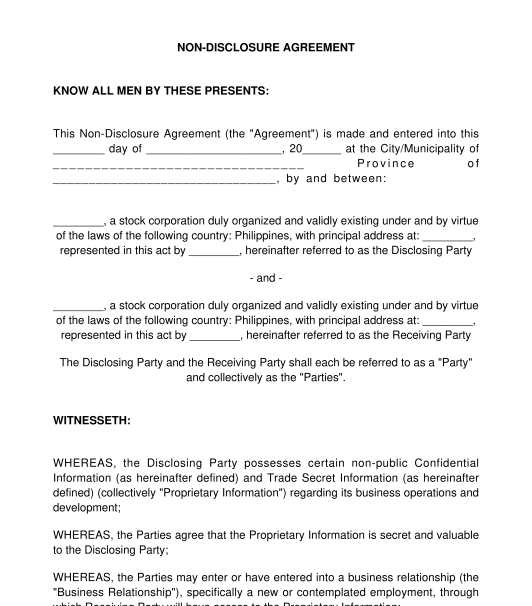 09/03/2025
09/03/2025

Answer a few questions and your document is created automatically.

Your document is ready! You will receive it in Word and PDF formats. You will be able to modify it.

 09/03/2025
09/03/2025
 Word and PDF
Word and PDF
 5 to 8 pages
5 to 8 pages
A Non-Disclosure Agreement is a document used to protect secrets or confidential information that is disclosed by individuals or businesses called the "disclosing party" to another called the "receiving party", pertaining to a business relationship between them. It creates an agreement between them where the receiving party will not disclose (share) or use confidential information for any purpose other than the purpose of the business relationship.
It can be used either when only one party is disclosing confidential information (a "one-way" disclosure) or when both parties are disclosing confidential information (a "two-way" disclosure).
This Non-Disclosure Agreement can be used in two ways, which may either be "One-way" or "Two-way" Disclosure:
Both documents are similar because they disallow a person from doing specific acts. They are usually used in employer-employee relationships, or client-and-service provider relationships, and are especially applicable to highly technical jobs, or in highly specialized industries such as information technology, human resources, and marketing.
These documents differ in what is not allowed, and is explained as follows:
While it is not mandatory to have a Non-Disclosure Agreement, it is recommended that there is a Non-Disclosure Agreement in case there is confidential information that is disclosed by one person to another. This is especially applicable to highly technical jobs or in highly specialized industries such as information technology, human resources, and marketing.
Confidential information refers to information that can cause damage to the business of a person who disclosed said information if they are disclosed to persons who should not have knowledge over them. Examples of confidential information are as follows:
The disclosing party and the receiving party should sign a Non-Disclosure Agreement. Note that the parties must be of legal age or 18 years old and above. Further, if the parties are organizations, the signatories may be the organization's representatives.
The disclosing party and the receiving party are free to choose how long the Non-Disclosure Agreement can last, it may be months or years. However, it must be noted that the duties of the receiving party in keeping the information disclosed as secret still apply for 5 years after the end of the Non-Disclosure Agreement. For instance, If the agreement ends on the 1st of January 2025, the information shall be kept secret until the 1st of January 2030.
Once the document is completed, at least two original copies of the document should be printed and all of the attachments described in the document should be attached. The disclosing party and the receiving party, or their authorized representatives, should read, and then sign all the copies of the document and each should keep an original copy. After this, the document may be notarized.
No, however, notarization will make the existence of the Non-Disclosure Agreement easier to prove in case a dispute concerning the same is brought to court. Further, notarization makes the Non-Disclosure Agreement a public document, which forces other persons who are not parties to the Non-Disclosure Agreement to respect the terms and conditions in the Non-Disclosure Agreement.
Notarization fees for a Non-Disclosure Agreement are typically PHP100 to PHP500.
A Non-Disclosure Agreement contains the following information:
The general laws on Contracts and Obligations found in the Civil Code of the Philippines are applicable. While there is no independent law that protects trade secrets, the Intellectual Property Code (Republic Act No. 8293), the Securities Regulation Code of 2000, the National Internal Revenue Code, the Toxic Substances and Hazardous and Nuclear Wastes Control Act of 1990 (Republic Act No. 6969), the Consumer Protection Act (Republic Act No. 7394), and the Revised Penal Code are some of the laws that offer protection to trade secrets.
You fill out a form. The document is created before your eyes as you respond to the questions.
At the end, you receive it in Word and PDF formats. You can modify it and reuse it.
A guide to help you: What are the Consequences of Breaching a Confidentiality Agreement or NDA?
Non-Disclosure Agreement (NDA) - sample template
Country: Philippines